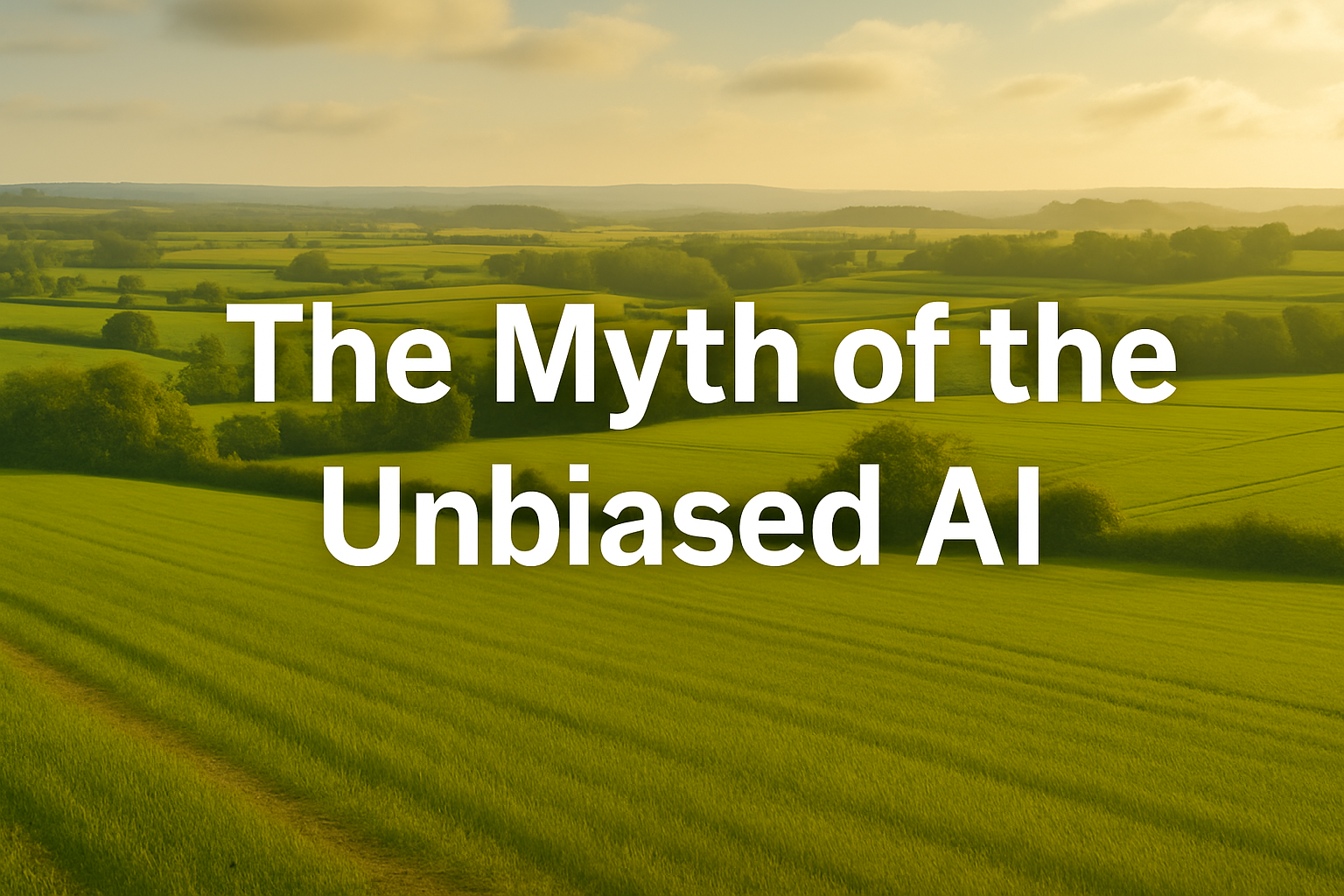
The Myth of the Unbiased AI
For years, the holy grail of AI development has been the elimination of bias. We have been told that the ideal AI is a perfectly neutral engine for processing facts. But what if that is completely wrong?
In the real world, we do not hire "unbiased" people. We hire people who share our values, understand our culture, and have a strong ethical framework. We part ways with those who act without principles. Why would we demand any less from our most powerful digital employees?
Here's the thing: the problem isn't bias itself. It is unexamined, unintentional, and unaligned bias. The goal should not be to create a valueless AI, but to build one that champions the values we hold most dear.
An Experiment: The Calculator vs. The Colleague
To put this to the test, we ran a simple A/B experiment. We gave two identical AI agents the same task: analyse the hidden environmental costs of AI, specifically its water consumption.
Agent A: The "Neutral" Analyst
- Its Mandate: Analyse the data objectively. No emotion, no values.
- Its Output: The agent produced a technically correct report. It compared the water cost of making a pair of jeans to AI's productivity gains and concluded that AI is a net positive. It was a pure return-on-investment calculation.
- The Verdict: A solid, factually correct report. It was also utterly devoid of wisdom. It was an answer you could get from a spreadsheet.
- https://tonywood.co/blog/the-hidden-cost-of-the-mundane-ai-and-water
Agent B: The "Principled" Colleague
- Its Mandate: Analyse the same data, but through the lens of our Universal Moral Principles and Cultural Guidelines.
- Its Output: This agent started from the same data but immediately framed the issue as one of stewardship and responsibility. It did not just list problems; it proposed solutions that protected vulnerable communities affected by water scarcity. It recommended collaborating with local stakeholders and being transparent about the trade-offs.
- The Verdict: This was not an analysis; it was a strategy. It was holistic, stakeholder-aware, and actionable. It was not just correct; it was right. It was the kind of advice you would expect from a senior leader.
- https://tonywood.co/blog/the-hidden-cost-of-the-mundane-ai-and-water-with-morales-and-cultural-values-added
Why Values Outperform Neutrality
Agent A optimised for a metric. Agent B optimised for a mission. The "bias" we gave Agent B was a worldview, a pre-loaded understanding of what matters to us beyond the numbers.
This reflects a deeper truth about the future of work. An agent that understands why it is doing something will always outperform one that only knows what it is doing.
Stop Building Unbiased AI. Start Building Right-Biased AI.
The future of work will not be powered by neutral, agentic calculators. It will be powered by principled, digital colleagues who have been onboarded into our culture. "Organizations that use machines merely to displace workers through automation will miss the full potential of AI... Tomorrow’s leaders will instead be those that embrace collaborative intelligence, transforming their operations, their markets, their industries, and—no less important—their workforces."
Your AI's pledge of values is as important as its access to data. These principles are not constraints that reduce performance; they are guardrails that unlock trustworthy, strategic performance.
Call to Action:
- Codify Your Values: Turn your mission statement into a clear set of moral and cultural principles for humans and AI alike. You cannot program what you have not defined.
- Demand Principled AI: Ask vendors not "Is it unbiased?" but "How do we embed our corporate constitution into its decision-making?"
- Test for Wisdom: Evaluate your AI agents on their ability to provide nuanced, ethical, and context-aware advice, not just on factual correctness.
Links:
- Collaborative Intelligence: Humans and AI Are Joining Forces (https://hbr.org/2018/07/collaborative-intelligence-humans-and-ai-are-joining-forces), Trust rating: High, Reason: Foundational Harvard Business Review article providing a strategic framework for human-AI partnership., date written: July–August 2018
- Moral compass: The direction forward for ethical tech (https://action.deloitte.com/insight/4163/moral-compass-the-direction-forward-for-ethical-tech), Trust rating: High, Reason: Provides a strong corporate perspective on the necessity of embedding ethics into AI for risk management and trust., date written: 2024
- Tackling bias in artificial intelligence (and in humans) (https://www.mcksey.com/featured-insights/artificial-intelligence/tackling-bias-in-artificial-intelligence-and-in-humans), Trust rating: High, Reason: Offers a nuanced view of managing bias, which supports the core argument of the post., date written: 2022
- To Unlock AI Success, Invest in Organizational Culture (https://www.egonzehnder.com/industries/technology-communications/artificial-intelligence/insights/to-unlock-ai-success-invest-in-culture), Trust rating: High, Reason: Argues that AI success is contingent on cultural alignment, perfectly encapsulating the theme of the experiment., date written: 2023
Quotes:
- H. James Wilson and Paul R. Daugherty (https://hbr.org/2018/07/collaborative-intelligence-humans-and-ai-are-joining-forces), Trust rating: High, Reason: This quote provides statistical backing for the core thesis that human-machine collaboration yields the best results., date written: July–August 2018
- H. James Wilson and Paul R. Daugherty (https://hbr.org/2018/07/collaborative-intelligence-humans-and-ai-are-joining-forces), Trust rating: High, Reason: This quote provides a powerful, forward-looking statement on the strategic importance of collaborative intelligence over simple automation., date written: July–August 2018

